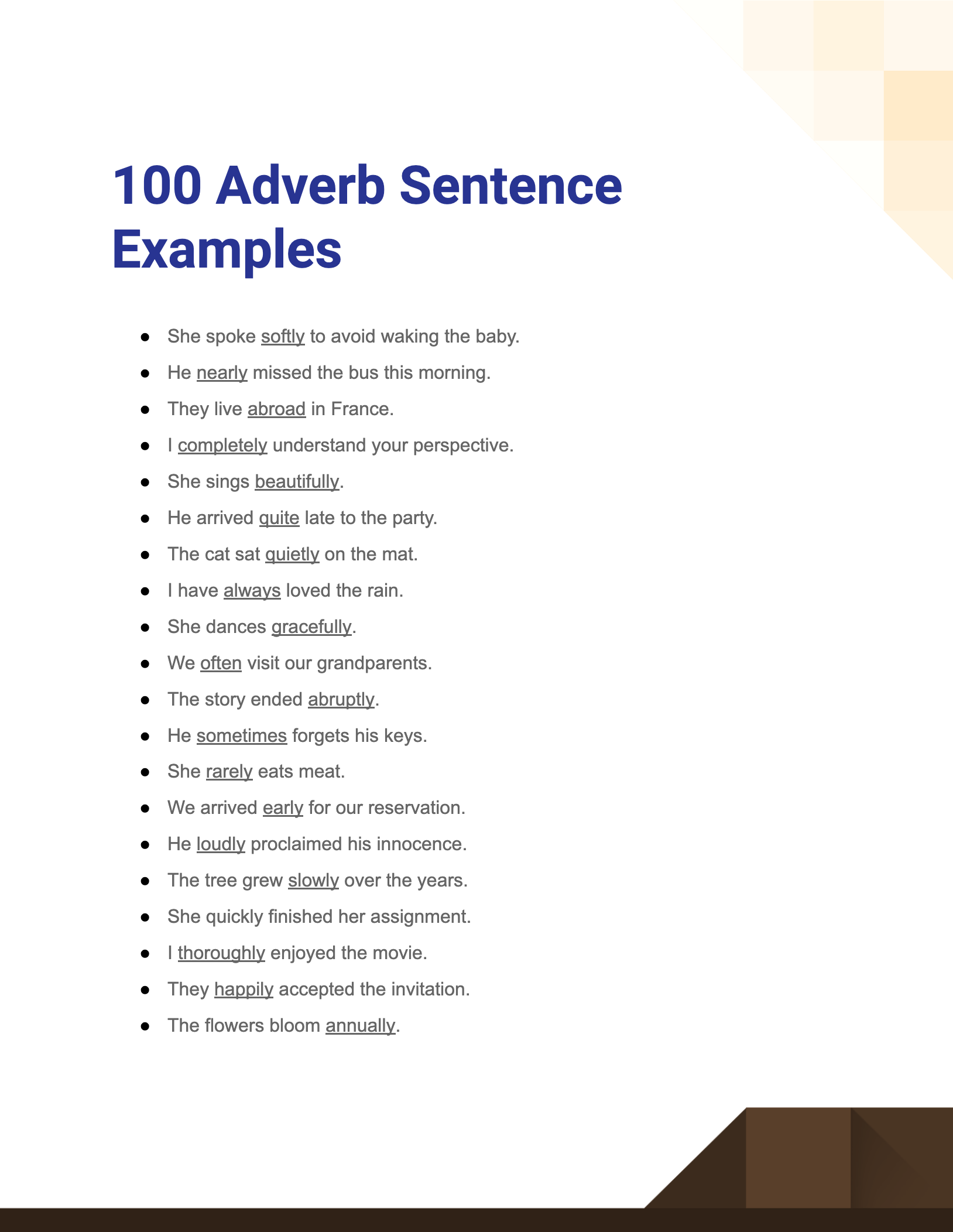99+ Adverb Sentence Examples
“Adverbs—the subtle enhancers of the English language! Whether you’re looking to amplify a verb, adjust an adjective, or even modify another adverb, these linguistic gems can transform your sentences. From crafting impactful statements to the nuances of adverb placement, our guide dives deep into real-world sentence examples and top usage tips. Harness the power of adverbs, refine your linguistic flair, and engage your readers with precision and style. Ready to elevate your prose? Let’s embark on this enlightening journey!”
What is an Adverb in a Sentence? – Definition
An adverb in a sentence is a word that modifies or describes verbs, adjectives, or other adverbs. It provides additional information about how, when, where, why, or to what degree an action takes place. Adverbs can offer clarity and detail, painting a vivid picture for the reader or listener of how an action is performed.
What is an example of an Adverb in a Sentence?

In the sentence, “She sings beautifully,” the word “beautifully” is an adverb. It modifies the verb “sings” by providing more information about the manner in which she sings. Another example is, “He arrived early for the meeting.” Here, “early” is the adverb describing when he arrived.
- She spoke softly to avoid waking the baby.
- He nearly missed the bus this morning.
- They live abroad in France.
- I completely understand your perspective.
- She sings beautifully.
- He arrived quite late to the party.
- The cat sat quietly on the mat.
- I have always loved the rain.
- She dances gracefully.
- We often visit our grandparents.
- The story ended abruptly.
- He sometimes forgets his keys.
- She rarely eats meat.
- We arrived early for our reservation.
- He loudly proclaimed his innocence.
- The tree grew slowly over the years.
- She quickly finished her assignment.
- I thoroughly enjoyed the movie.
- They happily accepted the invitation.
- The flowers bloom annually.
- He eagerly awaited her response.
- We should act immediately.
- She gently closed the door.
- The movie was incredibly good.
- He read the book twice.
- She seldom watches TV.
- The wind blew fiercely.
- They barely made it on time.
- I usually drink tea in the morning.
- She walked slowly towards the exit.
- He clearly misunderstood the instructions.
- The meeting ended promptly at 3 pm.
- I visit the beach frequently.
- The baby slept soundly.
- She boldly spoke her mind.
- They silently agreed with the decision.
- The bird sang sweetly.
- I suddenly remembered the appointment.
- We regularly clean the house.
- He honestly didn’t know the answer.
- The sun shines brightly.
- I absolutely love chocolate.
- They danced merrily all night.
- The lecture was particularly long today.
- She politely declined the offer.
- He works diligently every day.
- The water flowed smoothly.
- I briefly met her last year.
- They simply couldn’t believe it.
- She dressed elegantly for the party.
- I accidentally spilled the milk.
- They exactly knew what to do.
- The train finally arrived.
- She secretly wished for a miracle.
- We constantly think about our goals.
- The lion roared mightily.
- I recently started reading that book.
- They easily won the match.
- She tightly held the baby.
- He directly answered the question.
- The clock ticks steadily.
- I automatically knew the answer.
- She nervously awaited the results.
- They perfectly executed the plan.
- The flowers smelled wonderfully.
- I highly recommend this book.
- They warmly greeted each other.
- He safely reached home.
- The rain poured heavily.
- She barely whispered the secret.
- They enthusiastically cheered for the team.
- I typically avoid crowded places.
- He unfortunately missed the event.
- The project initially seemed easy.
- She patiently waited her turn.
- The bell rang loudly.
- I honestly cannot decide.
- They sadly bid farewell.
- The event surprisingly turned out well.
- She lovingly cared for the plants.
- We firmly believe in our principles.
- The bird swiftly flew away.
- I personally vouch for him.
- The room was neatly organized.
- They cheerfully sang songs.
- He desperately needed water.
- The story genuinely touched my heart.
- They correctly answered the questions.
- She gladly accepted the gift.
- The plan conveniently worked out.
- We joyfully celebrated the victory.
- He wildly gestured for help.
- The train moves rapidly.
- I essentially agree with you.
- She deliberately ignored the call.
- They vividly recalled the incident.
- The cat stealthily approached the mouse.
- I definitely need more practice.
- They hopefully looked for a sign.
- She tenderly kissed the baby.
Adverb Sentence Examples for Class 1
Introducing young learners to the vibrant world of adverbs can be an enlightening experience. Adverbs add color and detail to actions, painting a vivid picture of ‘how,’ ‘when,’ or ‘where’ something happens. Let’s explore some elementary examples tailored for first-grade minds, showcasing adverbs in a simple, understandable context.
- The dog barked loudly.
- She runs fast.
- We always eat dinner together.
- The bird sings sweetly.
- He jumped high.
- She smiled widely.
- I sometimes read before bed.
- He writes neatly.
- The cat meowed softly.
- They often play in the park.
Adverb Sentence Starter Examples
Adverbs aren’t just modifiers; they can be the linchpin to kick off a sentence, setting the tone and direction for the rest of the statement. Beginning a sentence with an adverb can capture attention, emphasizing the manner, frequency, or timing of an action. Here’s a dive into sentences where adverbs lead the charge.
- Quickly, she grabbed her coat and left.
- Suddenly, the lights went out.
- Often, I contemplate life’s mysteries.
- Rarely do I eat out on weekdays.
- Lazily, the cat stretched on the sofa.
- Usually, he walks to school.
- Tomorrow, we’ll embark on our adventure.
- Sometimes, the simplest things bring the most joy.
- Carefully, she placed the vase on the shelf.
- Outside, the rain began to pour.
These examples underscore the versatility of adverbs in English language constructs, both for young learners and more advanced contexts.
What is the Structure of Adverb Sentences?
An adverb can provide us with additional information about a verb, an adjective, another adverb, or even an entire sentence. Depending on its intended function in a sentence, an adverb’s placement can vary. Here’s a general guideline on the structure:
- Adverb + Verb
- E.g. She speaks softly.
- Verb + Adverb
- E.g. He runs quickly.
- Adjective + Adverb
- E.g. The movie was incredibly interesting.
- Adverb + Adverb
- E.g. He drove quite quickly.
- At the Beginning of a Sentence (for emphasis or style)
- E.g. Sometimes, I prefer reading over watching movies.
How to Use Adverbs in Sentences?
Adverbs add depth and detail to your sentences, but knowing where and how to use them is crucial for clarity and coherence.
- Modifying Verbs: The most common use of an adverb is to modify a verb. Place the adverb close to the verb it modifies.
- E.g. She gently closed the door.
- Modifying Adjectives: Adverbs can be used to change or qualify the meaning of an adjective.
- E.g. He was extremely tired.
- Modifying Other Adverbs: Adverbs can also modify other adverbs to provide clarity.
- E.g. He drove remarkably slowly.
- At the Start of Sentences: Some adverbs express time, frequency, or manner and can start a sentence.
- E.g. Tomorrow, we will go shopping.
- Negative Statements: Adverbs like ‘not’ and ‘never’ can be used to negate verbs.
- E.g. I do not like broccoli.
Tips for Using Adverbs in Sentences
- Less is More: While adverbs add detail, overusing them can make your writing seem cluttered. Use them when they add significant meaning.
- Position Matters: Place adverbs close to the words they modify to ensure clarity.
- Avoid Double Negatives: Using two negatives can make a sentence confusing. E.g., “I don’t need no help” should be “I don’t need any help.”
- Adverbs vs. Adjectives: Ensure you’re using an adverb and not an adjective. Remember, adverbs often end in ‘-ly’ (but not always).
- Be Specific: Instead of relying on adverbs, sometimes choosing a more specific verb can convey the same meaning. Instead of “ran quickly,” consider “sprinted.”
- Mind the Order: When using multiple adverbs, the order usually goes manner, place, then time. E.g., “She sang beautifully in the hall yesterday.”
By mastering the usage and placement of adverbs, you can bring precision, emphasis, and flair to your writing. They’re an essential tool for adding layers of meaning to your sentences and making your prose more engaging.



